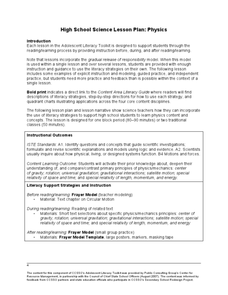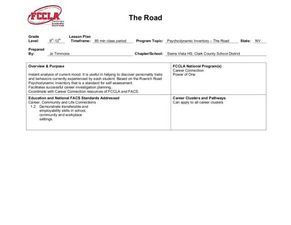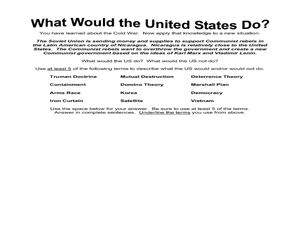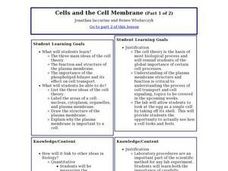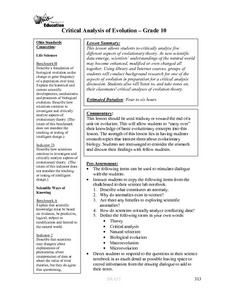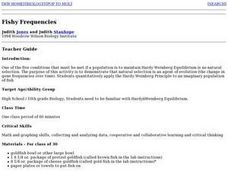Curated OER
AP: Chapter 24: The Origin of Species
AP biology buffs define vocabulary terms and answer critical-thinking questions about evolutionary trends. They compare macroevolution to microevolution, differentiate ploidy possibilities, explain isolation barriers, and more....
Curated OER
Circular Motion
Twelfth graders discuss centrifugal force, frictional force, and critical speed as it relates to the popular amusement park ride, the Gravitron.
Curated OER
The Road
Use psychodynamic theory as a part of analyzing a career cluster.The class defines vocabulary words, brainstorms a list of career traits, and completes an online career analysis inventory. They analyze 5 concepts of psychodynamic...
Curated OER
Teaching Controversial Science Issues Through Law Related Education
A set of lessons help aspiring scientists practice the critical thinking skills required for facing controversial issues such as evolution. As a group, they discuss what controversy consists of. They compare and constrast the concepts of...
Fun Music Company
Treasure Island Clues: Rhythm
Designed for rhythm level 1, the two games in this packet ask young musicians to identify the number of beats represented by a series of notes and notations, and then to use those numbers to answer a music trivia question.
NASA
Connecting Models and Critical Questions
Scholars use data to analyze and determine which sets of information need to be counted. They create a model to explain differences among chemical elements using graphs to prove concept mastery.
Curated OER
What Would the United States Do?
In this U.S. history scenario worksheet, students use their critical thinking skills to explain how the U.S. would respond in a scenario that involves the Soviet Union sending support to Communist rebels in Nicaragua.
Curated OER
Cells and the Cell Membrane
Pupils investigate the properties of cell membranes by isolating the membrane surrounding chicken eggs. They set up an experiment by placing eggs in a vinegar solution for three days. A powerpoint lecture emphasizes the structure of the...
Curated OER
Critical Analysis of Evolution
Tenth graders discuss anomalies in nature and science. They discuss times that anomalies led to the collection of data that explained the phenomena and contributed to changing scientific understandings. Students work in groups to...
Curated OER
Constructivist Theory
Students in a teacher education program are introduced to the constructivist theory. In grade level teams, they take their subject matter focus and create lesson plans related to the constructivist theory. They are graded with a rubric...
Curated OER
Children's Literature Meets Learning Theories
Students examine learning theories and principles through children's literature. In groups, they select theories and create multimedia presentations exemplifying them. Students discuss the various themes related to human growth,...
Curated OER
Ancient Atomic Theories
Studdnts research ancient texts and compare ancient Greek atomic theories, as used in the production of silver, to modern theories.
Curated OER
Advanced Critical Reading: Generations
In this critical reading worksheet, students read a passage about cycles of American generations then answer three questions based on the reading.
Curated OER
Advanced Critical Reading: Hubble
In this critical reading worksheet, students read a passage about the Hubble Telescope and then answer seven questions based on the reading.
Curated OER
Evaluating the Validity of Information-Did the Chinese Discover America in 1421?
Middle schoolers examine the discovery of the Americas. In this US History lesson, students investigate the theory that Chinese explorers initially discovered America. They collect research from a variety of sources, and distinguish...
Roald Dahl
The Twits - The Twits Get the Shrinks
Turn readers into investigative journalists. The 11th and final lesson that accompanies The Twits by Roald Dahl asks the question "What happened to Mr. and Mrs. Twit?" The lesson uses mind maps and group discussion to help answer the...
Curated OER
The Element of Color
Eighth graders study and analyze the elements of color by creating an personalized color wheel. Emphasis is placed on constructive criticism of student work by others for assessment. Students create short poems for their color wheel...
National Center for Case Study Teaching in Science
A Tale of Two Houses
Does it cost more per year to heat Bill's home in North Dakota or to cool Bubba's home in Georgia? Using heat transfer concepts, mathematical equations, and critical thinking skills, young engineers work in groups to determine who is...
Curated OER
Fishy Frequencies
Tenth graders demonstrate that natural selection is an agent of evolution. They quantitatively apply the Hardy-Weinberg Principle to an imaginary population of fish. They utilize math and graphing skills, collecting and analyzing data,...
Fun Music Company
Treasure Island Clues: Scales
Which Beatle received the most fan mail? To answer this music trivia question, young musicians must employ their knowledge of scales, key signatures, and leading notes to find the letters that spell out the name of one of the famous mop...
Curated OER
The Student Cafateria as the "Leafy Chestnut Tree"
Students examine the difference between "news" of earlier periods, and "news" as we know it today. They then go out into the school common areas and analyze news from the perspective of word-of-mouth storys and discuss what they can...
Foreign Policy Research Institute
The Mind of a Terrorist: A Psychosocial Perspective
What a great way to make a psychology lesson on personality development socio-politically relevant! Class members investigate causes of radicalism--specifically, becoming a terrorist. This resource includes background information, key...
Virginia Department of Education
Thermochemistry: Heat and Chemical Changes
What makes particles attract? Here, learners engage in multiple activities that fully describe colligative properties and allow the ability to critically assess the importance of these properties in daily life. Young chemists conduct...
Curated OER
Myth and Truth: The First Thanksgiving
Encourage learners to think critically about common myths regarding the Wampanoag Indians in Colonial America. They discover that behind every myth are many possible explanations—and that learning more about American history helps them...



